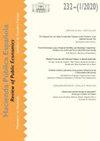拉丁美洲税收制度和社会支出对收入再分配和减贫的影响
IF 0.7
4区 经济学
Q3 ECONOMICS
Hacienda Publica Espanola-Review of Public Economics
Pub Date : 2016-01-01
DOI:10.7866/HPE-RPE.16.4.5
引用次数: 4
摘要
拉丁美洲通过税收制度和社会支出实现了多少再分配和减贫?本文总结了对9个国家(玻利维亚、巴西、哥斯达黎加、厄瓜多尔、萨尔瓦多、危地马拉、墨西哥、秘鲁和乌拉圭)应用可比财政发生率分析的结果。以基尼系数作为指标,巴西通过直接税和转移支付降低收入不平等的程度最大,危地马拉降低的程度最小。教育和卫生方面的公共支出比其他转移支付具有更高的均衡效果。加上间接税的影响,玻利维亚、巴西和危地马拉的贫困率高于市场收入贫困率本文章由计算机程序翻译,如有差异,请以英文原文为准。
The Impact of the Tax System and Social Spending in Income Redistribution and Poverty Reduction in Latin America
How much redistribution and poverty reduction is being accomplished through the tax system and social spending in Latin America? This paper summarizes results from applying a comparable fiscal incidence analysis to nine countries: Bolivia, Brazil, Costa Rica, Ecuador, El Salvador, Guatemala, Mexico, Peru, and Uruguay. Using the Gini coefficient as an indicator, Brazil lowers income in¬equality through direct taxes and transfers the most and Guatemala lowers it the least. Public spend¬ing in education and health have higher equalizing effects than other transfers. Adding the effect of indirect taxes leaves poverty higher than market income poverty in Bolivia, Brazil, and Guatemala
求助全文
通过发布文献求助,成功后即可免费获取论文全文。
去求助
来源期刊

Hacienda Publica Espanola-Review of Public Economics
Economics, Econometrics and Finance-Finance
CiteScore
0.90
自引率
14.30%
发文量
14
期刊介绍:
Hacienda Pública Española/Review of Public Economics welcomes submissions on all areas of public economics. We seek to publish original and innovative research, applied and theoretical, related to the economic analysis of Government intervention. For example, but not exclusively: Taxation, Redistribution, Health, Education, Pensions, Governance, Fiscal Policy and Fiscal Federalism.
In addition to regular submissions, the journal welcomes submissions of:
-Survey Reviews, containing surveys of the literature regarding issues of interest in the Public Economics field;
-Policy oriented reviews, showing the current contributions of Public Economics in relation to relevant contemporary issues affecting public decision-makers in the real world (Policy Watch);
-Comments of previously published articles. Contributions to this section should be limited to a maximum of 2 000 words (12 pages). If deemed adequate, the authors of the commented article will be given the opportunity to react in a Reply. Both Comment and Reply will be published together.
Articles for the Survey Reviews and Policy Watch section are subject to the same double blind reviwing procedure. The adequacy of Comments submitted for publication will be evaluated by the Executive Editors.
 求助内容:
求助内容: 应助结果提醒方式:
应助结果提醒方式:


